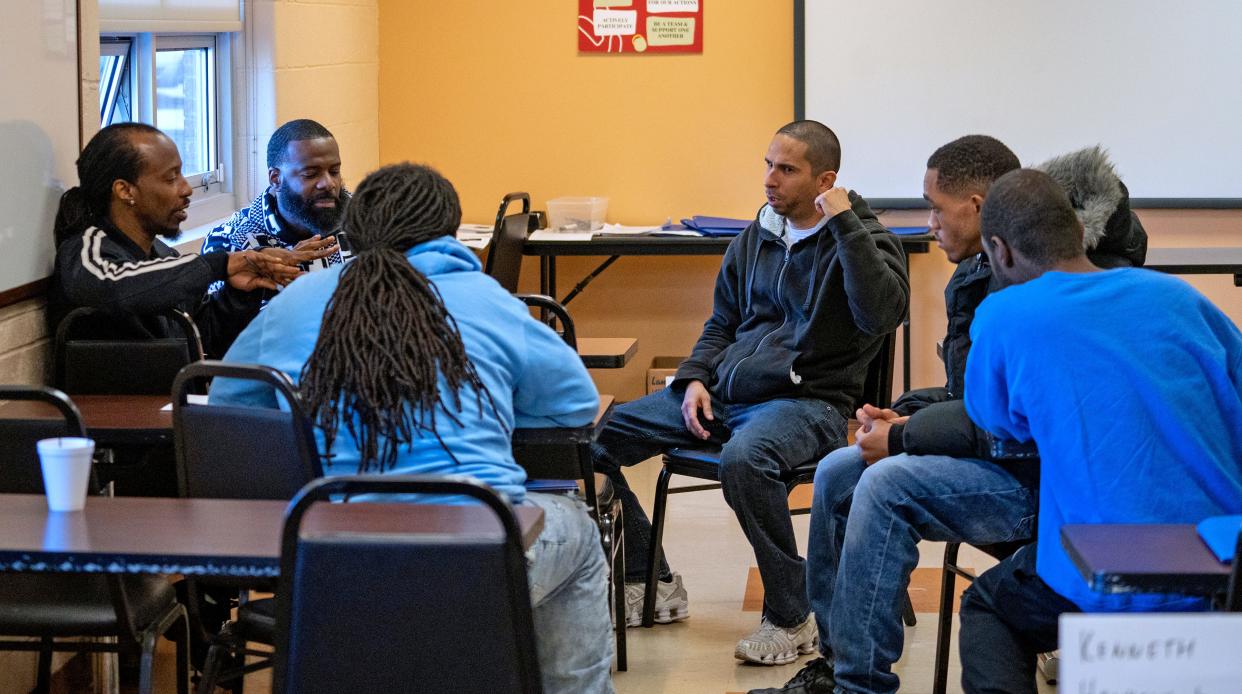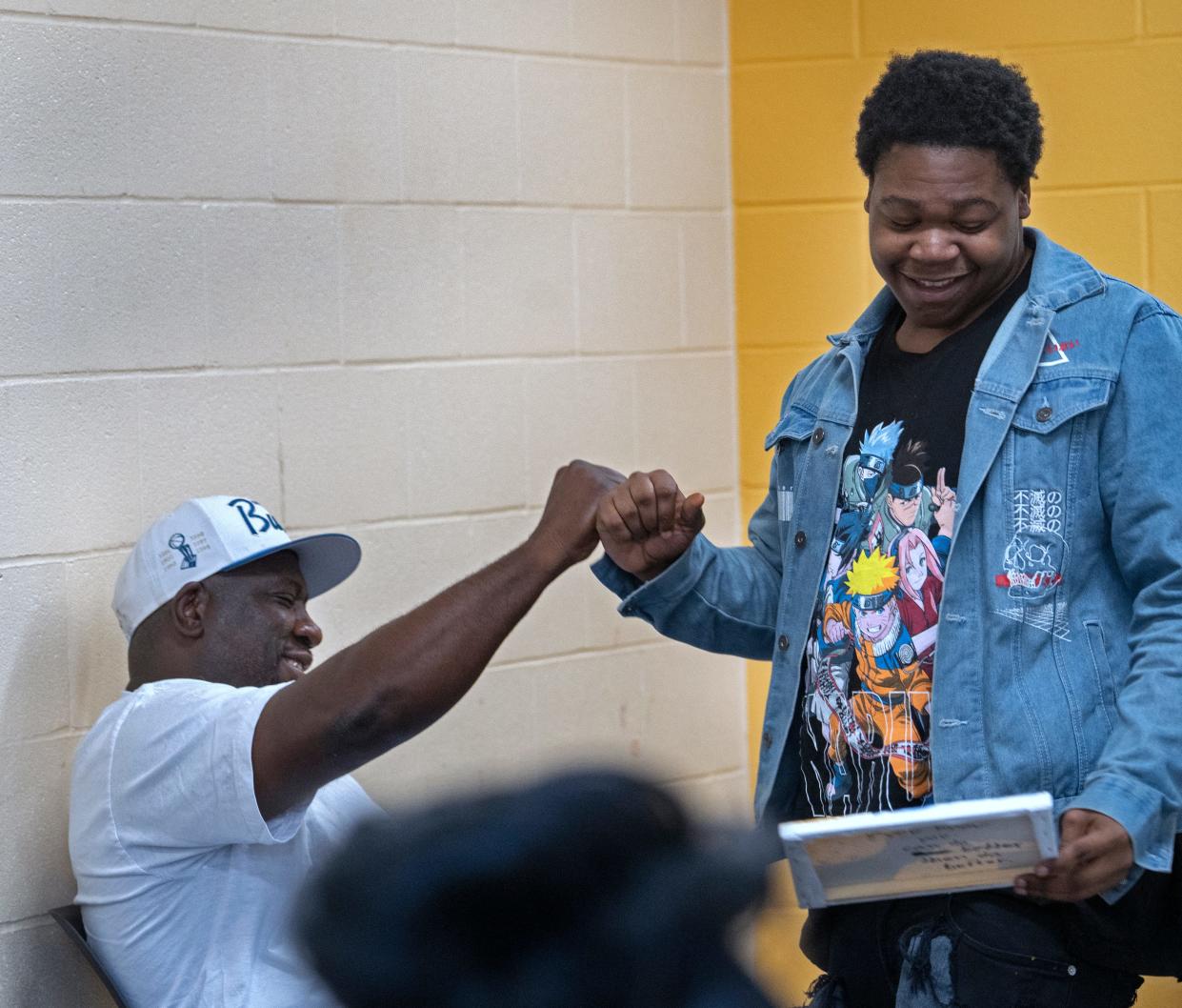Indianapolis violence: 5 groups you've probably never heard of that are finding solutions
It’s been attributed to more guns on the streets. Disruptions by the COVID-19 pandemic. An undermanned police force. A revolving door in the justice system.
More drug violence and retaliations. Weak police-community ties. A lack of familial love and discipline. A code of silence among witnesses.
Over the past 10 years, Indianapolis’ public safety experts have tried to zero in on the causes of an upward trend in shootings. And for much of the past decade, the city — under Republican and Democrat leadership — would see more homicides with each new year.
More: Is gun violence happening in your Indy neighborhood? Probably. Inside a year of shootings
The mesh of reasons why someone pulls the trigger is complex. It's no coincidence that Indiana University researchers found non-fatal shootings in recent years were striking neighborhoods challenged by poverty, unemployment and structural racism.
Community leaders are trying to resolve the life challenges they hear from Indianapolis residents in or near crime's sphere of influence.
Here are five local programs, and how they address the root causes of violence.
Helping men develop parenting skills

Fathers & Families Center has been providing parenting and job training classes to men looking to improve their lives in Indianapolis since 1993. Corey Parchman, vice president of programs and partnerships, says their work today is more relevant than ever.
He heard a story at a recent graduation ceremony that explains why. A man said he spent five years incarcerated. When he finally got out he spent five months looking for a job, without luck. "His first thought was, 'I'm about to do what got me in jail in the first place if I don't see a way out,'" Parchman said.
Then he found Fathers & Families Center. After finishing the program, he received his commercial driver's license. Now he's a certified truck driver and can take care of his family.
"That's how we're going to stop violence: Create stability in the household," Parchman said. "Once that father has stability in the household, he's able to pass that same stability down to his kids."
The center's core program is a 4-week series of classes. A recent class agenda provided to IndyStar gives a snapshot of what they learn: Successful renting. Budgeting 101. Launching a career. Parenting and family values.
More than 21,000 men have graduated since Fathers & Families started. One way the organization measures success is by checking graduates' involvement with the criminal justice system 90 days post-graduation. Less than 3% of graduates have picked up new court cases in that time period, Parchman said.
Giving gunshot survivors what they need
It's known as Code 77: the call that goes out to medical staff in Eskenazi Hospital when a gunshot victim comes in.
It also goes out to the specialists behind Prescription for Hope, an Eskenazi program that connects gunshot victims with the services they need to reduce their chances of being violently injured in the future.
"They've been shot, so they're thinking, 'What did I do to get in this situation?" said Blakney Brooks, the program's injury prevention coordinator.
Prescription for Hope staff visit survivors every day while they're in the hospital. They try to "meet (survivors) where they're at," Brooks said, with the goal of establishing a rapport.
In those vulnerable moments, some shooting survivors tell Prescription for Hope they want to go back to school or start their education. Others just want a safe place to live, Brooks said, especially if the violent act that sent them to the hospital occurred at home.
More than 1,000 people have gone through the program since it launched in 2009. Most patients are male, and about 29 years old.
A study from 2022 found that Prescription for Hope participants had a lower risk of being reinjured compared to violently wounded patients at IU Methodist Hospital, yet they faced greater odds of getting convicted for a violent crime.
Brooks said they're aware of that. They recently launched Hope Reentry to cater to patients with a history of criminal justice involvement.
"Some of those young men, because they had been in jail during that vulnerable time of becoming an adult, they don't know how to take $30 and go to the grocery store and eat for an entire week," Brooks said. "They don't know how to catch the bus."
Prescription for Hope works outside the hospital, too. Jordan Bartlett, who manages violence prevention, goes into neighborhoods and interacts with community centers and schools. He talks with families and tries to help young people avoid a visit to Eskenazi.
Youth in particular are "seeing a lot of the shootings happen," Bartlett said. "They're experiencing the death of loved ones which we know makes them more likely to become victims or perpetrators themselves."
Showing people how to live after incarceration
PACE helps people leaving incarceration get the tools and resources they need to successfully re-enter society. The organization's goal: Lowering the crime recidivism rate in Marion County.
Executive director Rhiannon Edwards says they take a holistic approach. Around 85% of the people they work with experience undiagnosed mental illness, trauma or substance use disorder. Someone in their program may need a job, but they may also need help tackling those other challenges.
PACE partners with more than two dozen organizations at the state and local level to carry out their work. Their employment and education team helps clients get gainful employment, and can help them earn their High School Equivalency diploma.
They offer substance abuse recovery coaching and counseling, pre-release services and employment efforts targeted at youth. Also at work is an on-site case manager who can address emergency needs for those who have recently left incarceration.
Edwards thinks residual trauma is a big factor that can lead to violence.
“When an active crime happens in the community, what resources are we wrapping around that community?” she said. “Because the child that sees the body on the ground, that could be trauma that goes with that child for the rest of their life, and that child could end up acting out in school, being expelled from school, eventually committing a crime.”
Getting guns off the streets is important, she said, "but the root (cause) is what I feel like we have to look at."
Supporting Indianapolis youth

The YES Indy Re-Engagement Center program and the Finish Line Boys & Girls Club on Indianapolis' northeast-side have created a sanctuary for young people aged 16-24 who are out of school and out of work.
They've got open gym basketball. A teen room stocked with a game console. Chick-fil-A sandwiches. Free haircuts from top barbers.
That's how the programs entice them. Once at the facility, they're exposed to job connections, mentorship from people who know the northeast side and a safe space for young men and women to share what they're going through.
YES Indy Rec, which is housed at the Boys & Girls Club, has a long-term goal to build positive, mentor-like relationships with the young people who pass through it. They also try to engage them in High School Equivalency (HSE) or job placement programs.
Nearly nine out of 10 participants say they now have someone to talk to because of the program, according to data provided by YES Indy Rec. Another eight out of 10 have received help with a job, and learned to control their anger.
The location houses a gun safe where participants can drop off and store firearms while on campus. According to Jon Johnson, YES Indy Rec's director, at least one firearm gets dropped off each week.
“I look at that as a huge measurement of success when they're voluntarily giving it, and they're speaking out about them having it,” he said.
Many of the young people who attend YES Indy Rec and carry firearms do so because they walk everywhere and think they need it for protection.
“Our young people aren’t monsters,” Johnson said. “Everybody can't be helped, but I just think our young people need huge arms wrapped around them, and the city needs to know we need to wrap our big arms around our adolescents.”
YES Indy Rec recently expanded to the north side of the city. They now have a program at Watkins Park.
Using education to stop domestic violence
Firearms play a big role in domestic violence. According to the Domestic Violence Network's State of Domestic Violence Report from 2020, the presence of a gun in a domestic violence situation increases the risk of homicide by 500%.
That's why DVN focuses on education as prevention. Beyond advocating for background checks to keep guns out of the hands of abusers, DVN teaches communities about setting healthy boundaries and dealing with trauma.
Kelly McBride, DVN's executive director, told IndyStar that by creating training programs and placing an advocate locally in Martindale-Brightwood, that neighborhood recently went from having the highest number of domestic violence calls in the state to the second highest.
She said restorative justice — where the accused is held accountable for their actions but also helps repair the harm they've caused — is key. “I’m a believer that if you start with a healthy individual, then you have a healthy couple, then you have a healthy home and then you have a healthy community.”
Contact IndyStar reporter Katie Wiseman at klwiseman@gannett.com. Follow her on Twitter @itskatiewiseman.
Call IndyStar courts reporter Johnny Magdaleno at 317-273-3188 or email him at jmagdaleno@indystar.com. Follow him on Twitter @IndyStarJohnny
This article originally appeared on Indianapolis Star: Indianapolis violence: 5 groups finding solutions in our neighborhoods
